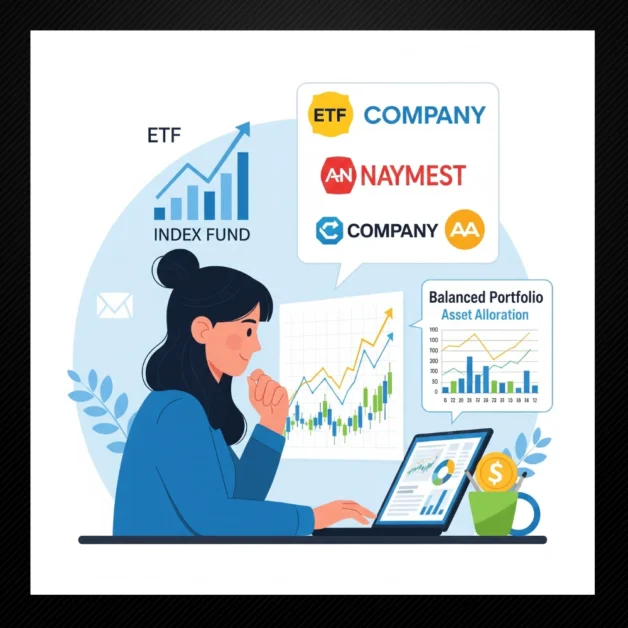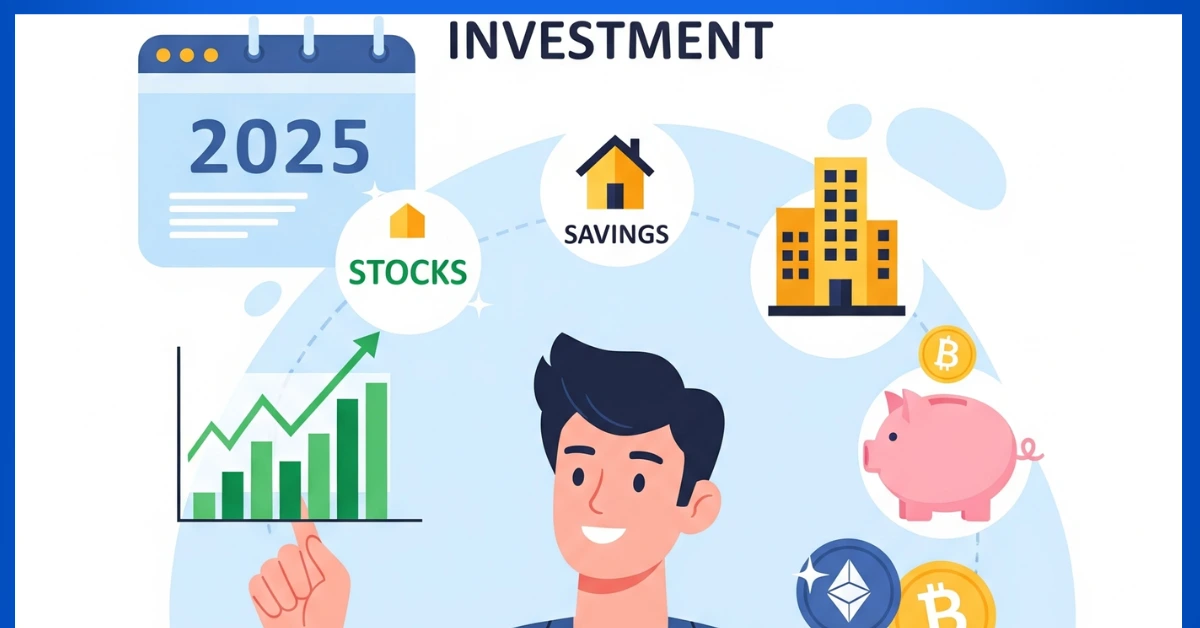Investing money wisely is one of the best decisions you can make for your future. In 2025, there are many beginner friendly options available that don’t require a finance degree or a large amount of capital. Whether you’re saving for a home, retirement or simply want your money to grow, the key is to start early and stay consistent.
Why You Should Start Investing
Before we dive into specific options, let’s look at why investing matters.
- Let your money grow: Over time, your savings can increase in value through the power of compound interest.
- Beat inflation: Investing helps your money maintain its value by outpacing inflation.
- Achieve financial goals: Whether it’s buying a car, funding education or retiring early, investments make big goals achievable.
- Build financial discipline: Regular investing builds money management habits.
Tips for Beginners Before You Start
Before putting your money anywhere, follow these basic guidelines:
- Set clear goals: Are you saving for a house, education, or retirement?
- Know your risk tolerance: Some people are okay with risks, others prefer safety.
- Begin with what you have: Even a small amount is enough to start investing.
- Spread your risk: Avoid putting all your money into a single investment.
- Be consistent: Make investing a regular habit, no matter how small the amount.
This article breaks down some of the best investment options for beginners in 2025 in simple, easy-to-understand language.
Top Investment Options Comparison Table (2025)
| Investment Option | Risk Level | Returns | Liquidity | Minimum Investment | Best For |
|---|---|---|---|---|---|
| High-Interest Savings | Very Low | Low | Very High | Very Low | Emergency fund, zero-risk savers |
| Certificates of Deposit | Low | Low to Medium | Low | Low to Medium | Safe long-term savers |
| ETFs / Index Funds | Medium | Medium to High | Medium to High | Low | Long-term, diversified investors |
| Mutual Funds | Medium | Medium | Medium | Low to Medium | Passive investors wanting expert management |
| Real Estate Crowdfunding | Medium | Medium to High | Low | Medium | Real estate enthusiasts, long-term goals |
| Robo-Advisors | Low to Medium | Medium | Medium | Very Low | Hands-off, tech-friendly beginners |
| Cryptocurrency | High | Very High | High | Very Low | High-risk, tech-savvy investors |
| Government Bonds / T-Bills | Very Low | Low | Low to Medium | Medium | Conservative investors |
| Dividend Stocks | Medium | Medium | Medium | Medium | Passive income seekers, long-term holders |
| Education & Skills | None | High (Indirect) | N/A | Varies | Career-minded individuals |
High Interest Savings Accounts
This is the safest and easiest way to begin. High interest savings accounts offer better returns than regular bank accounts and are ideal for keeping emergency funds or short term savings.
Pros:
- Safe and insured by banks
- Easy access to your money
- No risk of losing the original amount
Cons:
- Lower returns compared to other investments
- Over time, returns may fall short of inflation growth
- Best for Emergency funds and people who want zero risk
Certificates of Deposit (CDs)
A Certificate of Deposit is a savings product where you deposit money for a fixed period and get it back with interest. It’s a low-risk option with slightly higher returns than savings accounts.
Pros:
- Guaranteed returns
- No risk if you keep money until maturity
- Better interest than savings accounts
Cons:
- Your money is locked for a fixed period
- Penalties for early withdrawal
- People who don’t need immediate access to their funds
Stock Market (via ETFs or Index Funds)
If you’re ready to take a bit of risk for better returns, consider investing in the stock market. ETFs and index funds are beginner friendly investment options that offer simple and affordable access to the stock market. They allow you to invest in a bundle of stocks, reducing the risk tied to any single company.
Pros:
- Higher potential returns over time
- Easy diversification
- Affordable to start with small amounts
Cons:
- Prices can fluctuate
- You may lose money in the short term
- Best suited for those planning to invest long term and can handle market ups and downs.
Mutual Funds
Mutual funds are managed by professionals who pool money from multiple investors to buy stocks, bonds or other assets. Beginners often prefer mutual funds for their simplicity.
Pros:
- Managed by professionals
- Diversified portfolio
- Easy to invest through banks or apps
Cons:
- Management fees
- Less control over what’s invested
- Best for People who want expert management and hands-off investing
Real Estate Crowdfunding
Buying a house or property might be out of reach for beginners but real estate crowdfunding platforms allow you to invest small amounts in large real estate projects and earn returns.
Pros:
- Entry into the real estate market with less money
- Potential for passive income through rental profits
- Diversifies your investment portfolio
Cons:
- Longer holding periods
- Property markets can fluctuate
- Returns are not guaranteed
- Best for Investors with a medium to long-term focus and interest in real estate
Robo Advisors
Robo-advisors are digital platforms that automatically create and manage an investment portfolio for you, tailored to your financial objectives. They’re ideal for people who don’t want to do all the research themselves.
Pros:
- Low fees
- Automatic portfolio rebalancing
- Hands off investing experience
Cons:
- Limited customization
- Your investments are guided by software, not a personal advisor.
- Best for Beginners looking for an easy, tech-driven way to invest
Cryptocurrency (with caution)
Cryptocurrency is a popular but volatile investment. Bitcoin, Ethereum and other digital currencies offer high rewards but come with serious risks.
- High potential returns
- Easy to buy via trusted apps
- Innovative and futuristic
Cons:
- Highly volatile
- Not regulated in many areas
- Possibility of hacking or scams
- Best for tech-savvy beginners with a high risk tolerance
Government Bonds or Treasury Bills
These are low risk investments where you loan money to the government in exchange for interest payments over a set period. They’re extremely safe but offer lower returns.
Pros:
- Very low risk
- Regular interest payments
- Backed by the government
Cons:
- Low returns compared to stocks or ETFs
- Long lock in periods for some types
- Best for Risk-averse investors looking for stability
Dividend Stocks
Dividend paying stocks give you regular income along with any potential value increase in the stock. It helps generate steady passive income in the long run.
Pros:
- Steady income
- Can grow in value over time
- Ideal for long term wealth building
Cons:
- Company performance affects payouts
- Stocks still carry market risk
- Best for Beginners with a long-term focus and interest in income generation
Education & Skill Investment
Investing in yourself is often the best investment. Courses, certifications and training programs can increase your earning potential and improve your financial future.
Pros:
- Long term return in the form of better jobs or promotions
- Boosts your confidence and knowledge
- Flexible options, including online learning
Cons:
- May take time before returns are seen
- Requires effort and consistency
- Best for Everyone, especially those just starting their career
FAQs
1. What’s the minimum amount needed to begin investing?
You don’t need a lot to get started. Many platforms allow you to invest with as little as Rs. 500 to Rs. 1,000 or even less in mutual funds, ETFs or through robo advisors. The key is to begin, no matter how small.
2. What is the difference between saving and investing?
Saving means setting aside money with little or no risk for short-term goals. Investing, on the other hand, involves using your money to potentially earn more over time, but with some level of risk involved.
3. Can I lose money while investing?
Yes, certain investment types like stocks, cryptocurrencies and mutual funds come with market risk, meaning there is a chance of losing money, especially in the short term. However, smart and diversified investing over time usually leads to growth.
4. How do I know which investment is right for me?
The best investment depends on your goals and risk tolerance. For safety, choose savings or bonds. For higher returns, go with ETFs or stocks. A mix is often smartest.
Final Thoughts
Starting your investment journey in 2025 is easier and more accessible than ever. With so many beginner friendly options, from high-yield savings and ETFs to robo advisors and REITs, there’s something for every budget and risk level. Remember, the most important part of investing is to get started. Even small investments can grow over time with patience and consistency. Educate yourself, avoid emotional decisions and think long term.



